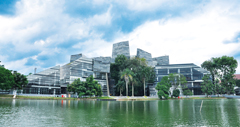Opportunities for growth 'never better'
The Indonesian archipelago presents logistical challenges but has significant potential, writes Barry Clarke

All of us at Taylor & Francis congratulate Indonesia on being the Guest Country at this year’s Frankfurt Book Fair.
From our regional HQ in Singapore we support the needs of Indonesian scholars and librarians, and with the help of our representative based in Jakarta, we would be happy to hear from anyone wishing to engage with us, to meet either your publishing or your research information needs.
Taylor & Francis first published research written in the Malay Archipelago by a Welshman 150 years ago. Alfred Russel Wallace explored the region that we today call Indonesia, Malaysia and Singapore from 1854 to 1862. Wallace articulated for the first time the theory of evolution by natural selection, prompting Charles Darwin to publish his own theory of evolution. The Malay Archipelago remains one of the best travelogues ever published.
Today Indonesia is at the heart of ASEAN (The Association of Southeast Asian Nations) and the opportunities for growth and developments in the region have never been better. Of course there are challenges in establishing a regional economic union, but ASEAN, since its foundation in 1967, has been particularly successful in promoting regional cooperation and peace, and these are the twin foundations of economic progress.
Research in Indonesia
The foundations have been laid already and there are models in the region to look to for inspiration.
The University of Indonesia is the oldest and highest ranked university in the country, having been founded in 1849 as a medical college. It has developed several partnerships with foreign universities in order to provide international double degree programmes and these are popular with international students. These allow the student to graduate with a degree from UI and another from the partner university such as the University of Melbourne, the University of Queensland and the University of Amsterdam.
There are more than 6,000 foreign students enrolled in higher education in Indonesia. The majority come from Malaysia where there has also been significant investment in higher education over the last two decades. In addition, both public and private universities in Indonesia are starting to offer programmes taught completely or partly in English. These institutions include Binus University, Pelita Harapan University in Jakarta, and University of Surabaya and Widya Mandala Catholic University in Surabaya, as well as the University of Indonesia.
The greater use of English will result in a more regionally integrated and internationally orientated education system and ensures research from Indonesia has a greater impact around the globe.
Currently, despite Indonesia’s population being over eight times that of Malaysia, the latter country generates about seven times as many scholarly articles. Collaboration between academics in global universities and research centres improves the overall quality of the output, and this is critical for informing evidence-based policy.
Areas of national expertise such as agriculture, international relations, development studies, Islamic studies and Islamic finance deserve to have global recognition and this may come if more opportunities for international collaboration with researchers in Indonesia can be established.
Without doubt, investment in the university and research sector must be sustained and this might start in the libraries with the latest IT infrastructure, and related vocational training. Furthermore the role of the library can evolve to include a hub where best practice in research methodology and publishing can be shared. Taylor & Francis is one of the most active academic publishers that provide help in organising such training opportunities, and I would be delighted to hear from anyone wishing to organise a workshop at their institute or department. The archipelago of islands present challenges logistically, but the technology of the digital age should be harnessed to join the many islands together.
The digital age brings a multitude of opportunities to increase the visibility and accessibility of Indonesian research. A first step might be to digitise scholarly material published in Bahasa and encourage its usage through social media which may immediately broaden educational opportunities. The promotion of a sustained scholarly and popular publishing programme in both Bahasa and English, the world can become better acquainted with those areas of national expertise such as how Indonesia as a progressive predominately Muslim nation has come to terms with its colonial past; or how it has recently made the transition to a successful democratic state.
Barry Clarke is managing director of Taylor & Francis Asia Pacific






